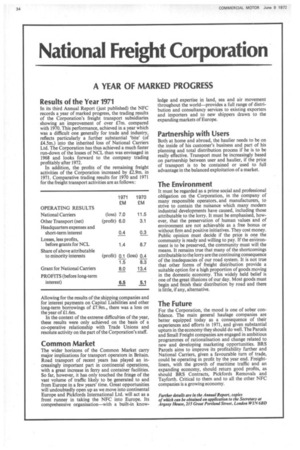National Freight Corporation
Page 36

If you've noticed an error in this article please click here to report it so we can fix it.
A YEAR OF MARKED PROGRESS
Results of the Year 1971
In its third Annual Report (just published) the NFC records a year of marked progress, the trading results of the Corporation's freight transport subsidiaries showing an improvement of over £7m. compared with 1970. This performance, achieved in a year which was a difficult one generally for trade and industry, reflects particularly a further substantial 'bite' (of £4.5m.) into the inherited loss of National Carriers Ltd. The Corporation has thus achieved a much faster run-down of the losses of NCL than was envisaged in 1968 and looks forward to the company trading profitably after 1972.
In addition, the profits of the remaining freight activities of the Corporation increased by £2.9m. in 1971. Comparative trading results for 1970 and 1971 for the freight transport activities are as follows: ledge and expertise in land, sea and air movement throughout the world—provides a full range of distribution and consultancy services to existing exporters and importers and to new shippers drawn to the expanding markets of Europe.
Partnership with Users
Both at home and abroad, the haulier needs to be on the inside of his customer's business and part of his planning and total distribution process if he is to be really effective. Transport must be increasingly based on partnership between user and haulier, if the price of transport is to be contained or used to full advantage in the balanced exploitation of a market.
The Environment
It must be regarded as a prime social and professional obligation on the Corporation, in the company of many responsible operators, and manufacturers, to strive to contain the nuisance which many modern industrial developments have caused, including those attributable to the lorry. It must be emphasised, however, that the preservation of human values and of environment are not achievable as a free bonus or without firm and positive initiatives. They cost money. Public opinion must decide if the price is one the community is ready and willing to pay. If the environment is to be preserved, the community must will the means. It remains true that many of the shortcomings attributable to the lorry are the continuing consequence of the inadequacies of our road system. It is not true that other forms of freight distribution provide a suitable option for a high proportion of goods moving in the domestic economy. This widely held belief is one of the great illusions of our day. Most goods must begin and finish their distribution by road and there is little, if any, alternative.
The Future
For the Corporation, the mood is one of sober confidence. The main general haulage companies are better equipped today as a consequence of their experiences and efforts in 1971, and given substantial upturn in the economy they should do well, The Parcels and Small Freight companies are engaged in ambitious programmes of rationalisation and change related to new and developing marketing opportunities. BRS Parcels aims to improve its profitability further and National Carriers, given a favourable turn of trade, could be operating in profit by the year end. Freightliners, with the growth of maritime traffic and an expanding economy, should return good profits, as should BRS Contracts, Pickfords Removals and Tayforth. Critical to them and to all the other NFC companies is a growing economy.




































































































